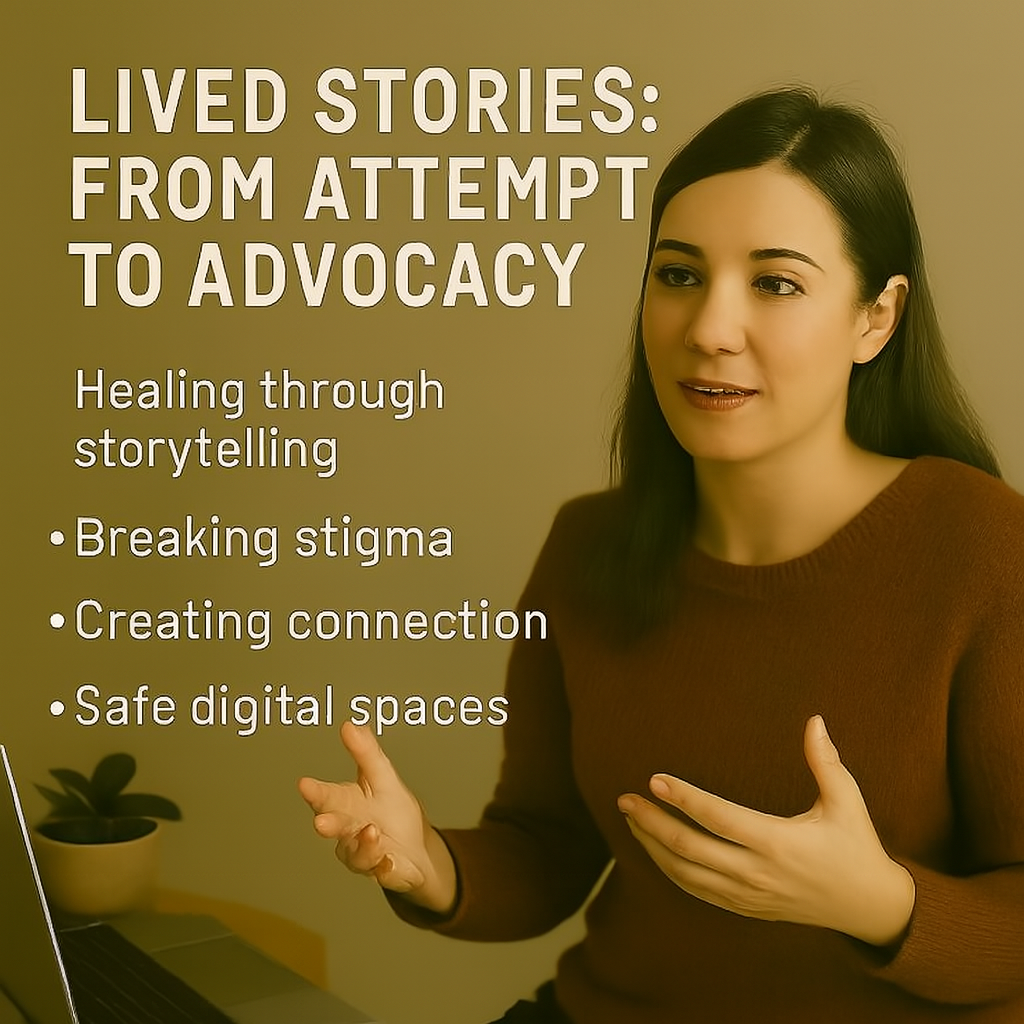Lived Stories: From Attempt to Advocacy – The Impact of Sharing Personal Experiences
Introduction
Survivors of suicide attempts often speak about how sharing their stories has helped them move from a place of deep struggle to a space where they can help others. By opening up, they challenge the stigma around suicide and mental health, and show others that recovery is possible. This article looks at the importance of sharing these personal experiences and how they can make a difference for both the person telling the story and those listening.
Why Sharing Matters: The Power of Personal Stories
When people share their experiences of mental health struggles, it’s more than just telling a story. For survivors, it’s a way to process what they’ve been through and make sense of things. But it also allows others who may be going through something similar to feel seen and understood. Talking openly about suicide can break down the walls of isolation and shame, making it easier for others to open up too.
Survivors who speak about their experiences help others realize that they are not alone. Hearing someone else’s story can make it easier to see that there is hope, and that it’s okay to ask for help. For many, knowing that someone else has been where they are can give them the courage to take that first step toward recovery.
Creating Safe Spaces: The Role of Digital Platforms
Platforms like Wojodi Amal provide a much-needed space for people to share their experiences anonymously. These spaces are especially helpful for individuals who don’t have the support or understanding of those around them. The anonymity gives them a chance to speak freely without fear of judgment. Through these platforms, people can connect with others who have been through similar situations, offering comfort and solidarity.
Online spaces also allow for a sense of community, even if it’s just virtual. Survivors can read each other’s stories, share their own, and feel part of something bigger than their struggles. It’s a safe place to express emotions and find understanding from others who really get it.
Storytelling as a Way to Encourage Change
Stories from survivors do more than just help the individual sharing them. They can spark change in how society views suicide and mental health. Sharing personal experiences opens up conversations that might not otherwise happen, and helps people see that mental health struggles don’t define a person’s worth.
Here’s why stories are so impactful:
1. Building a Sense of Connection
When survivors speak up, it shows others that they’re not alone. Hearing someone else’s story can help someone feel less isolated in their own struggle, and can give them the strength to reach out for help. A sense of community is vital when it comes to recovery—knowing that others understand can make a world of difference.
2. Giving a Real Picture of Mental Health Struggles
Each person’s experience with suicide and mental health is different. Storytelling is one of the best ways to show just how complex these issues can be. It’s not just about one moment of despair—it’s about everything that leads up to it and how recovery happens in its own time. Survivors’ stories give a much-needed look into what living with mental health struggles can really be like, helping others see beyond stereotypes or assumptions.
3. Helping Others Find the Courage to Ask for Help
When someone hears a story of survival, it can help them see that asking for help is not only okay, it’s necessary. Sharing stories of recovery encourages others to take that first step and reach out to get the help they need. It shows that recovery is possible and that it’s okay to seek support.
Your Story Makes a Difference: How Sharing Can Help Others
There’s something incredibly empowering about sharing your story. For survivors, it’s a way of taking control over what happened to them, and turning it into something that can help others. By talking about their experiences, survivors not only help themselves—they also offer support to others who may be struggling.
The simple act of sharing can make a big difference. It’s a reminder that even in the darkest times, there’s a way out, and there are people who understand. Every person who shares their story is helping to break down the stigma and show that talking about mental health issues can save lives.
Conclusion: Why Sharing Stories Matters
For those who’ve been through suicide attempts, telling their story isn’t just about reliving a painful chapter in their life. It’s about offering support, breaking down barriers, and helping others feel seen and heard. Digital spaces like Wojodi Amal make it easier to share these stories and find people who can relate.
Sharing stories can spark change. It shows others that they’re not alone, that recovery is possible, and that it’s okay to ask for help. Each person who shares their experience is playing a part in making the world a more understanding and supportive place for those who struggle with mental health.
References
Husain, S. I., & Haddad, M. (2021). The Role of Storytelling in Mental Health Recovery: Empowering Individuals through Narrative Sharing. Journal of Community Psychology, 49(5), 1756-1767. https://doi.org/10.1002/jcop.22447
Pescosolido, B. A., et al. (2013). Stigma and Mental Health Help Seeking: The Role of Family, Friends, and Colleagues. Social Science & Medicine, 72(11), 1682-1690. https://doi.org/10.1016/j.socscimed.2011.11.010
Seale, C., et al. (2017). The Role of Online Support Groups in Recovery from Mental Illness: A Qualitative Study of Depression Support Communities. Health Psychology, 36(9), 848-856. https://doi.org/10.1037/hea0000513
Chung, H., et al. (2019). Social Support and Mental Health Recovery: A Study of Suicide Survivors. Journal of Affective Disorders, 243, 155-163. https://doi.org/10.1016/j.jad.2018.08.073
Gould, M. S., et al. (2018). The Impact of Suicide Prevention Stories on Public Awareness and Help-Seeking Behavior. Suicide and Life-Threatening Behavior, 48(4), 477-485. https://doi.org/10.1111/sltb.12394

